Dylan talking about "King Lear"
Dylan discusses "King Lear" and "The Basement Tapes" with Jonathan Cott
Substack Intro
This time around. we look at Shakespeare and Dylan once again by looking at part of an interview that I was reminded of after my book came out. It should really have been part of the chapter “Shakespeare in Dylan”, though it is much easier to present here than in the pages of a book. That is because what was said and what was printed diverge so significantly. My thanks to Harry Hew for doing the reminding and furnishing me with tape.
I shared a shorter version of this before, both on my old website and in a reply to a Dylantantes conversation. However, with Graley Herren recently highlighting the Cott interview an excellent piece on Bert Cartwright, and in keeping with a promise I made to Erin Callahan in an interview that comes out later this month, here is an expanded version.
What you have is:
1 What was printed in January 1978 from the December 1977 Dylan interview by Jonathon Cott.
2 Audio of what was actually said at that interview.
3 Transcription of said audio.
4 A visual representation of everything in one place: what was said but not printed, what was printed but not said, and what was said and printed.
5 What was said next in the interview, plus a parlour game for rainy afternoons.
1 What was printed
Note: Cott’s words are in bold (not Dylan’s) in the printed Rolling Stone interview. Despite seeing this as the wrong way around, I have maintained it here so as not to confuse matters if you pursue the links to the full interview at my article’s conclusion.
Strangely, the scene where the two women confront Renaldo reminds me of King Lear, in which each of the daughters has to say how much she loves her father.
You’re right. Renaldo sees himself as Cordelia.
I’ve always interpreted some of the Basement Tapes as being concerned with ideas from King Lear: “Too much of nothing/Can make a man abuse a king”; “Oh what dear daughter ‘neath the sun/Would treat a father so,/To wait upon him hand and foot/And always tell him, ‘No’?”
Exactly. In the later years it changed from “king” to “clown.”
King Lear had a fool around him, too, and when the fool leaves, Cordelia comes back. She takes his place, and he takes hers.
The roles are all interchangeable.
As in “Tangled Up in Blue” and as in your movie.
Yes it is.
Were you specifically influenced by King Lear when you wrote songs like “Tears of Rage”?
No, songs like that were based on the concept that one is one.
“… and all alone and ever more shall be so.”
Exactly. What comes is gone forever every time.
But one is difficult to deal with, so Christians gave us the Trinity.
The Christians didn’t bring in anything — it was the Greeks.
2 What was said
Note: As the interview begins, Dylan seems relaxed but also distracted, perhaps making sure a companion is comfortably seated,and that offhand manner towards the interviewer lingers through parts of the exchange. At certain moments, however, his tone sharpens, as in an emphatic “no” directed back at Cott. His repeated use of the word “exactly” functions, I would suggest, as a kind of defensive strategy
This recording only occasionally intersects with what was printed.
3 Transcript of the actual conversation
Cott: What interested me about that scene was that you actually put yourself in a position there were two women and you were trying to define…you had to decide how much you loved each of them. Now, in “King Lear”, by Shakespeare, Cordelia has to say how much she loves her father and the other two sisters say ‘ I love you 100%”. And the daughter, Cordelia says, ‘I love you as much as I should love you, considering I am your daughter. That to me is true love.’
Dylan: Right. What does Renaldo say?
Cott: Renaldo says the same thing as Cordelia.
Dylan: He says, ‘Do I love you like her?’ What does he say…
Cott: He says. ‘I love you differently’, basically. I love you and I love her - I don’t love you the same way. That time was like King Lear and the scene with the three sisters, three daughters.
Dylan: You’re right. Renaldo sees himself as King Lear. There’s a similarity to it…yeah
Cott: I knew there was something about it. You see, I interpreted some of the Basement Tapes as being concerned with ideas
from King Lear: “Too much of nothing /Can make a man abuse a king”.
Dylan: Exactly, exactly
Cott: I wrote a review of that once. I don’t know if you ever read it…
Dylan: I didn’t read it.
Cott – Just as well. But the idea of: “Oh what dear daughter ‘neath the sun/Would treat a father so,/To wait upon him hand and foot/And always tell him, ‘No’?” To me… is what “King Lear” is about to me.
Dylan: Exactly. In the later years it changed, father to mother.
Cott – whose later years, yours or his, King Lear’s?
Dylan: His
Cott: King Lear’s. He had a fool around, too,
Dylan: That’s true
Cott: and when the fool leaves..
Dylan: …he falls apart
Cott: …Cordelia comes back. Cordelia takes the place of the fool, clearly, you know he’s in-between…
Dylan: That’s exactly true, but the roles are all interchangeable.
Cott: It’s like your movie – it’s like “King Lear” a little bit, isn’t it?
Dylan: Yes, it is.
Cott: I didn’t know that you were interested in “King Lear”, particularly.
Dylan (pause) Mmmm.
Cott: I always thought you were but every time I read(wrote?) it, people thought it was pretentious, saying that. It’s interesting that….what about “Tears of Rage”? That’s a “King Lear” song”
Dylan: Exactly.
Cott: What about “Too Much of Nothing”? I mean, King Lear is a play in which something comes from nothing and your song is ‘nothing comes from nothing’ “Too much of nothing can make a man abuse a king.” Were you reading that play at the time or what?
Dylan (emphatically)No. It’s all based on the concept that one is one.
Cott: “…and all alone and ever more shall be so.” You know that line (rhyme?)
Dylan: Exactly.
Cott: I don’t understand that rhyme? Was it about God? It’s about God isn’t it?
4 All together, now
NOTE:
The parts in red are what was said but not printed, and the bits struck through were not spoken, but were printed, finally, the bits in normal, black text were said and printed as said.
Rewritings are revealing in what is added and what is omitted, as well as what is changed.
Just a reminder:
red = was said, not printed
strikethrough = not said, but printed
normal, black text = said and printed
The interview goes on from there to consider some religious topics. Interestingly, given what was to transpire later in the year of publication, Dylan can be heard repeatedly asserting “There weren’t any Christians” before insisting, “Jesus was a Jew”.
Those quotes do not appear in the published interview. A parlour game for a rainy afternoon would be to compare, again, the printed and the recorded versions and to see which parts of the spoken you can find in the in the printed interview, which is available here:
If you were to play that parlour game on a rainy afternoon, then you would have to listen to this as your soundtrack. On the other hand, no-one could concentrate on anything else while listening to the ethereal beauty of Dylan, here;
Substack Outro
Nothing can follow that, and so fare thee well until the next time.


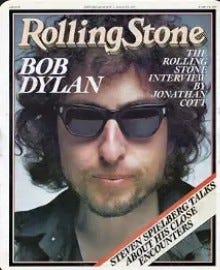
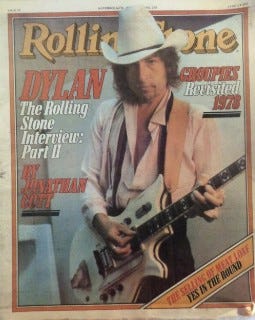
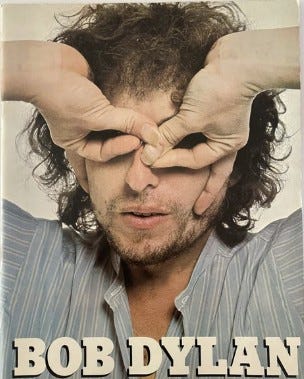
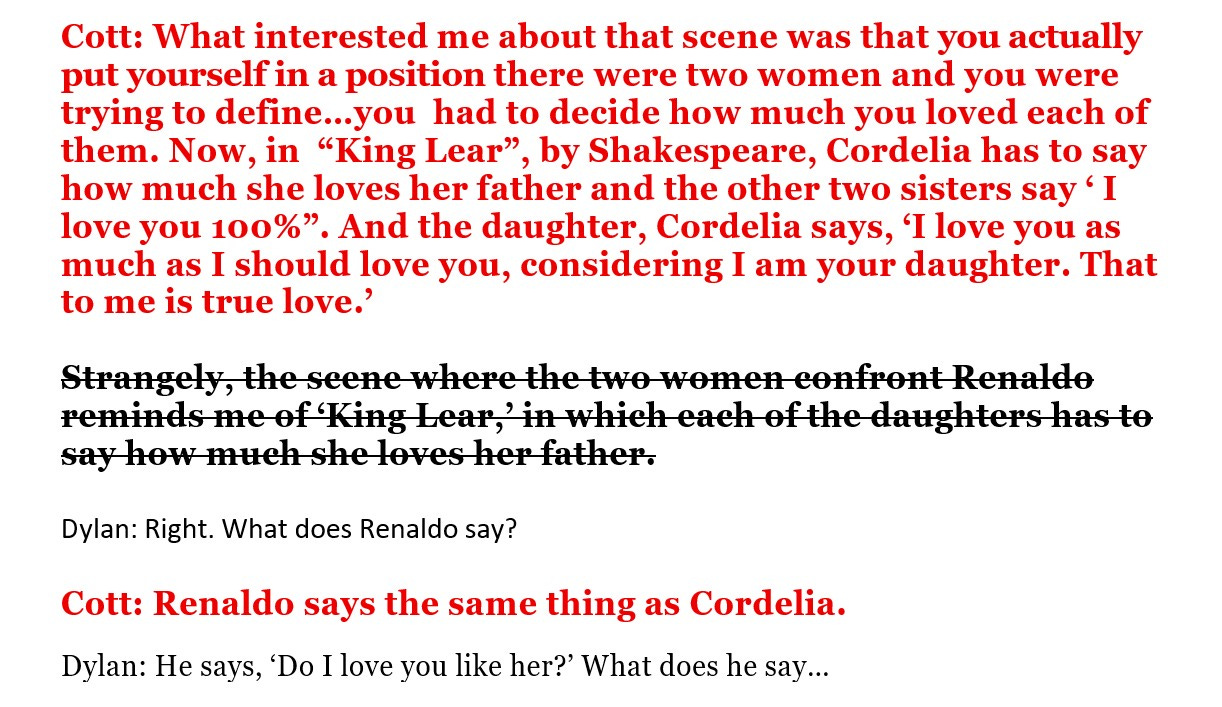
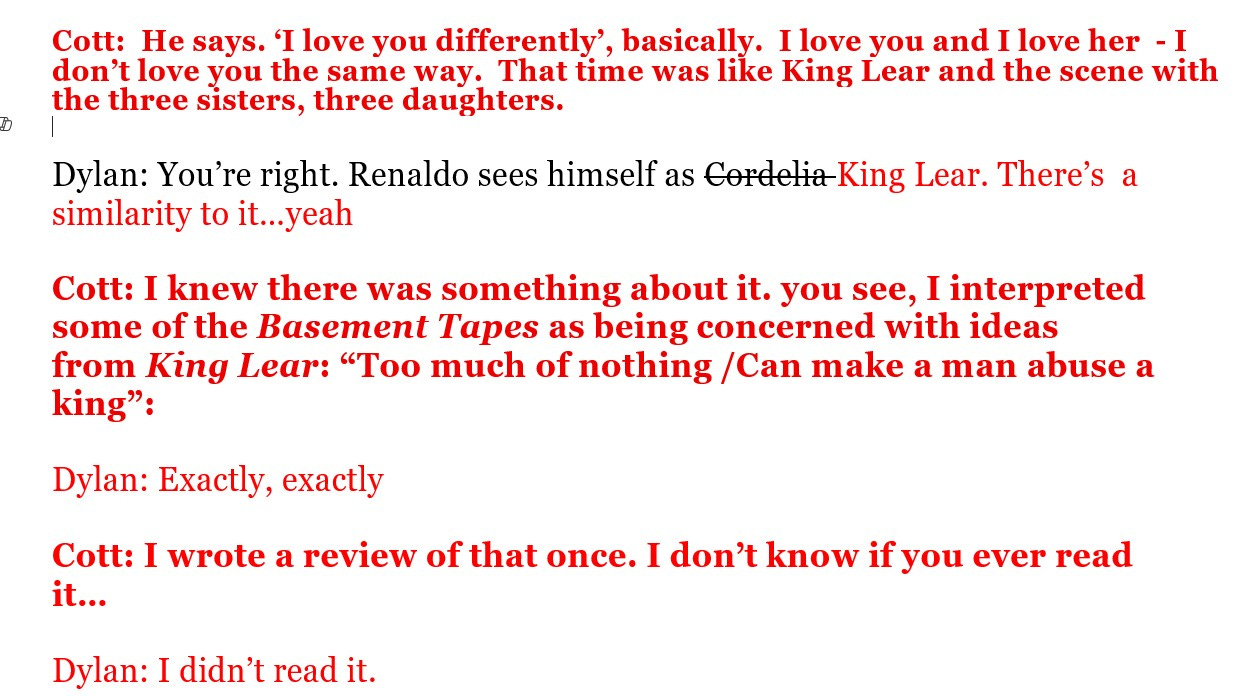
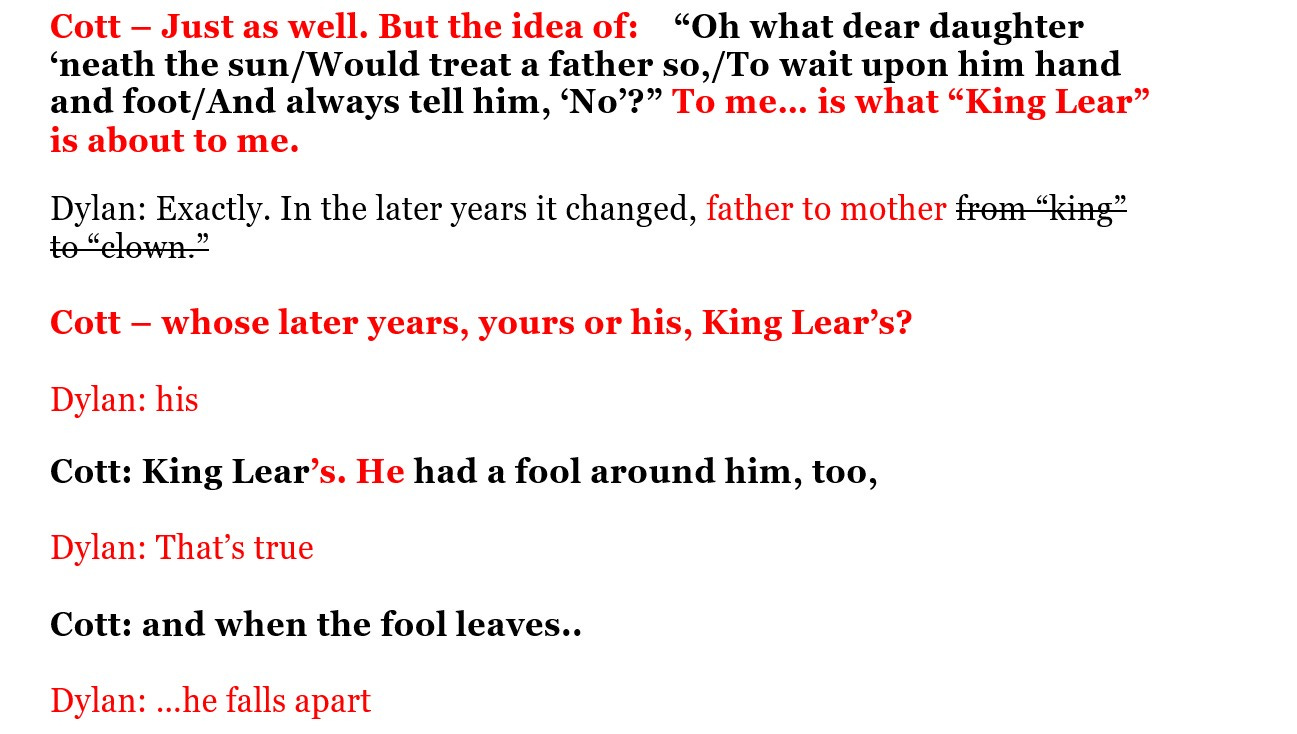
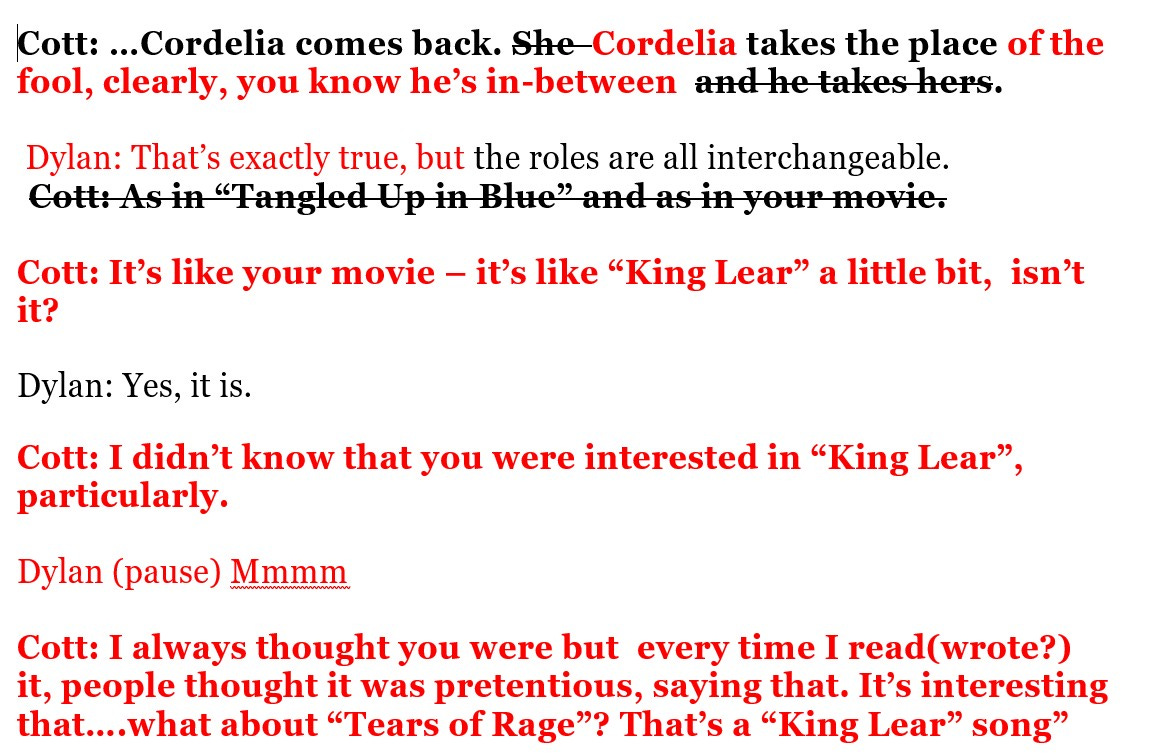
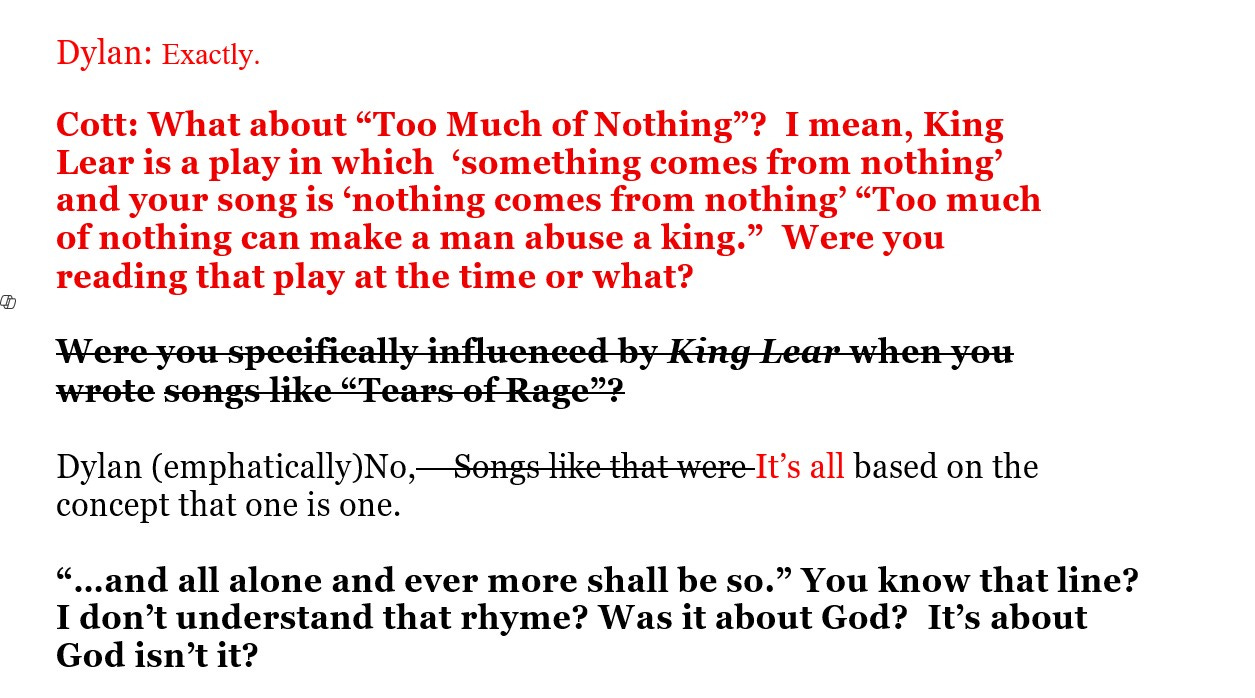

Some ideas and phrases of "Idiot Wind" would also fit into King Lear's world,
First the medieval idea the wheel of fate and fortune in which the pauper can become King, also used as a central idea in "danse macabre", where 'the bottom' relates to death. In Lear it would suggest a lack "ordo," the underlying philosophical characteristic of a well structured society.
"Now everything′s a little upside down
As a matter of fact the wheels have stopped
What's good is bad, what′s bad is good
You'll find out when you reach the top
You′re on the bottom”
Also the use of "seeing" and "blindness" also a central idea in King Lear.
"“I noticed at the ceremony
Your corrupt ways had finally made you blind
I can't remember your face anymore
Your mouth has changed, your eyes don't look into mine”
Last but not least, the sense of "foolishness" and "idiocy" which seems to pervade the whole fabric of society.
Thanks Andrew – for discussing links between Dylan and Shakespeare’s greatest work. Some fascinating moments in the Cott recording. “Jesus was a Jew! He was exploited.”
For some reason I find it moving and arresting that when Cott asks Dylan about the women in the Kaddish scene: “Those old women. I mean, Let’s face it. That is the most vulnerable thing in the film. These pathetic, old women who are interested in…” And Dylan forcefully interrupts: “No. They’re not pathetic old women.” Cott: “I don’t mean pathetic but they are…I mean Allen Ginsberg talks about that thing about her vagina and you cut on that. That was striking.” Dylan (forcefully): “Those women are strong.”
The Kaddish scene is one of the highlights of Renaldo and Clara, but interpretations differ. I found it moving. My wife thought the women in the scene were cruelly used.
My suspicions that Dylan is playing games with Cott (or arguably playing games with anyone who tries to understand Renaldo and Clara) gather momentum when Dylan explains: “We don’t know who Renaldo is, we only know who he isn’t. We know he’s not the Masked Tortilla.”